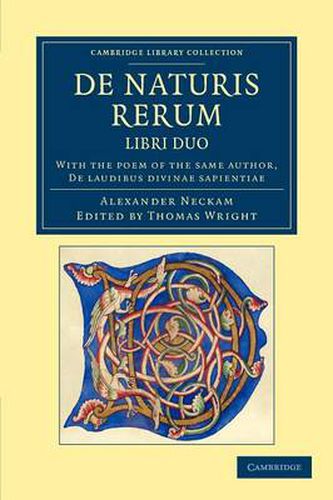Readings Newsletter
Become a Readings Member to make your shopping experience even easier.
Sign in or sign up for free!
You’re not far away from qualifying for FREE standard shipping within Australia
You’ve qualified for FREE standard shipping within Australia
The cart is loading…






Thomas Wright (1810-77) was a highly prolific scholar of Old and Middle English and archaeology, although some of his work, particularly that on prehistory, was contentious. The present work, which he edited and published in 1863, comprises two texts by Alexander Neckam (1157-1217). The son of Richard I’s foster mother, Neckam was a respected teacher and prolific scholar who became abbot of Cirencester. The larger of these texts, De naturis rerum, consists of a scientific manual followed by a theological treatise, a commentary on Ecclesiastes. Neckam later produced an abbreviated verse form of this, the second text found here. The first part of each text is a compendium of all the scientific knowledge of western Europe and England in the twelfth century, which Neckam aimed to treat morally as well as factually. In producing this edition, Wright has included the Latin marginal annotations, possibly by Neckam himself, found in his manuscript exemplars.
$9.00 standard shipping within Australia
FREE standard shipping within Australia for orders over $100.00
Express & International shipping calculated at checkout
Thomas Wright (1810-77) was a highly prolific scholar of Old and Middle English and archaeology, although some of his work, particularly that on prehistory, was contentious. The present work, which he edited and published in 1863, comprises two texts by Alexander Neckam (1157-1217). The son of Richard I’s foster mother, Neckam was a respected teacher and prolific scholar who became abbot of Cirencester. The larger of these texts, De naturis rerum, consists of a scientific manual followed by a theological treatise, a commentary on Ecclesiastes. Neckam later produced an abbreviated verse form of this, the second text found here. The first part of each text is a compendium of all the scientific knowledge of western Europe and England in the twelfth century, which Neckam aimed to treat morally as well as factually. In producing this edition, Wright has included the Latin marginal annotations, possibly by Neckam himself, found in his manuscript exemplars.